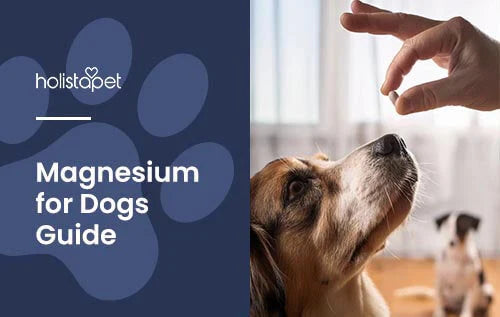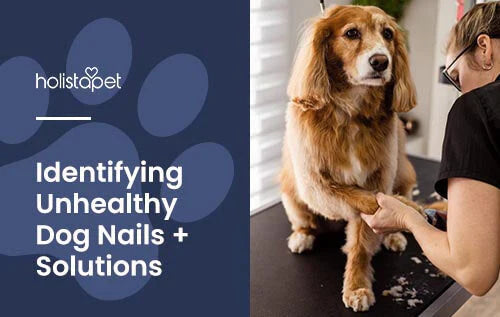Is your dog's fur a little dull, or are their joints a bit stiff? The solution might be hiding in plain sight. We're talking vitamin E for dogs! This powerful antioxidant can help ensure your furry friend's optimum health, from potentially boosting your dog's defenses to supporting their muscle development.
In this nifty guide, we'll explore the amazing health benefits of vitamin E for dogs. Plus, we'll answer all your burning questions about vitamin E supplements. By the end, you'll know exactly how to keep your dog's health thriving for years to come!
What Is Vitamin E?
Vitamin E is a fat-soluble vitamin that helps your dog stay healthy in many ways. This potent antioxidant is like a tiny guardian that protects cells by neutralizing free radicals. Free radicals are unstable molecules that can negatively affect cell function. These little troublemakers can come from air pollution, ultraviolet light, certain chemicals, and even normal metabolic processes.
By preventing oxidative damage (the imbalance between antioxidants and free radicals in the body) and supporting cell membranes, vitamin E can help block different health issues. In your dog's body, this essential vitamin can support immune function, promote healthy skin and shiny fur, aid muscle integrity, and a whole lot more.
There are different types of vitamin E, but the one you need to remember is alpha-tocopherol. It's the most biologically active and beneficial one. As you can see, ensuring your dog gets enough vitamin E is vital for their longevity. It's like giving them a shield to live a long, healthy life.

7 Health Benefits of Vitamin E for Dogs
Vitamin E for dogs is no one-trick pony. It's a multitasking marvel with numerous health benefits for our four-legged friends. Vitamin E's key advantages include:
- A Powerful Antioxidant. Protects your pet's cells from free radical damage, which can then prevent various health problems.
- Supports the Immune System. Helps strengthen your dog's immune system, making it easier for them to fight off illnesses and infections.
- Promotes Skin and Coat Health. May ease itchy skin and aid wound healing. Also gives your pup's coat a healthy shine.
- Aids Joint Function. Promotes healthy joints by supporting cartilage health, easing discomfort, and improving mobility.
- Supports Muscle Integrity. Ensures proper muscle function and helps prevent muscle degeneration and weakness.
- Promotes Eye Health. Protects eye cells from oxidative damage, combating poor vision and eye degeneration.
- Potential Anti-Inflammatory Effects. With anti-inflammatory properties that may help reduce redness and puffiness and soothe irritated areas.
What Is Vitamin E Deficiency in Dogs?
Vitamin E deficiencies are no fun. When dogs don't get the essential vitamins they need, things can take a turn for the worse. They will have to deal with annoying symptoms and possibly more serious health issues if the problem is not fixed immediately.
Dogs with vitamin E deficiency might experience muscle weakness. This weakness can make playtime less fun and walks a struggle. Other signs include skin dryness, skin irritation, and a dull coat.
A lack of vitamin E may also weaken the immune system and make pets more prone to infections and illnesses. In really bad cases, a deficiency can cause poor vision and muscle degeneration.
Recognizing all these signs during the early stages of vitamin E deficiency is important. With early intervention, you can protect your pup from pesky long-term issues.
How Much Vitamin E Do Dogs Need?
There's no magic number. The amount can vary based on factors like age, size, and diet. But generally, we're talking about a daily dosage of around 1 to 2 International Units (IU) per pound of body weight.
Puppies and younger dogs might need less vitamin E. Meanwhile, older pets or those with health concerns may require more. It's best to consult your vet to figure out the perfect dose for your pet.
How Do I Add More Vitamin E to My Dog's Diet?
Addressing nutritional imbalances is key to good dog nutrition. If your dog's diet needs more vitamin E, you can try:
- Natural Sources
- Vitamin E Supplements
While these methods can help your pup receive more vitamin E, remember that it all starts with a complete and balanced diet. Ensuring your dog's food contains all the essential nutrients they need can make a world of difference in their life.

Natural Sources
Give your pup's nutrition a nudge by adding more natural vitamin E to their dog food. There are many vitamin E-rich foods pet parents can mix into different dog foods for a tasty vitamin boost.
For example, sunflower oil is rich in the essential vitamin. Just drizzle sunflower oil over your dog's food for a fuss-free approach. Other excellent sources include leafy green vegetables, nuts, seeds, and fish oil. These human foods provide vitamin E plus other essential nutrients.
Vitamin E Supplements
Need another way to give your dog vitamin E? Try supplements. These health aids deliver a precise dose of the vital nutrient, which can help bring benefits while preventing unwanted side effects.
The best part? These dog products come in fun and easy-to-use forms, making it super simple to add them to your pet's routine. You can choose from soft chews, tablets, capsules, powders, or liquids.
Vitamin E Supplementation for Dogs - Frequently Asked Questions
Ever wonder if vitamin E supplements are right for your pup? You're not alone! Lots of pet parents have questions about this vital nutrient. Fear not; we've got all the answers you need. Keep reading because we have some great info coming up for you.
What Vitamin E Supplements Are Available for Dogs?
Alright, so your pup might need a little extra vitamin E. But how do you give it to them? Here are some options:
- Soft Chews. These are easy to give and double as treats. For example, HolistaPet's Multivitamin Soft Chews for Dogs in savory bacon flavor is an excellent choice. This product's signature vitamin blend contains vitamin E plus vitamins A, C, D, and other vital nutrients.
- Tablets or Capsules. If you have a cooperative pup, give these supplements directly to them. Alternatively, you can hide a tablet or capsule in your dog's food for a stealthy approach.
- Powders. These are great for mixing into pet foods. Powders ensure an even distribution of the supplement.
- Liquids. If you're dealing with a picky eater, simply add the liquid supplement to their water or food.
Browse all Holistapet's supplements for dogs here.
How Do I Know if My Dog Needs Vitamin E Supplementation?
The first step is to pay close attention to your dog's health and behavior. Signs your pup might lack vitamin E include muscle weakness, skin issues, and poor immune response. Dogs with certain health conditions or on specific diets might also require extra vitamin E.
If your dog shows any of these symptoms, they may need extra vitamin E. To confirm your suspicions, visit your vet for a precise diagnosis.
How Do I Choose the Best Vitamin E Supplement for My Dog?
We all want the best for our furry BFFs, right? So, when it comes to picking a vitamin E supplement, here are a few things to remember:
- Natural Ingredients. Avoid products with artificial additives and fillers that may harm pets.
- Reputable Brand. Look for a reliable name in the pet wellness space. For example, HolistaPet (that's us!) has been trusted by dog owners and vets alike for many years.
- Regulatory Compliance. If a supplement complies with guidelines from experts like the American Feed Control Officials (AAFCO), it's usually a sign of good quality.
- Veterinary Recommendation. Vet approval is key, too. Luckily, all HolistaPet supplements are vet-recommended and lab-tested for your peace of mind.
What Is the Suggested Vitamin E Dosage for Dogs?
The right amount depends on a dog's size, age, and health. As a general rule, dogs should receive about 1 to 2 International Units (IU) of vitamin E per pound of body weight daily. Consult your vet for a tailored dose that can help prevent over- or under-dosing.
Can Dogs Overdose on Vitamin E?
Although rare, dogs can overdose on vitamin E. Going overboard can cause tummy troubles like diarrhea or vomiting. In even rarer cases, the vitamin can affect blood clotting because it can act like a tiny blood thinner. To avoid these issues, follow the recommended dosage and consult your vet before supplementing.
Can I Give My Dog Human Vitamins?
Human vitamins are a no-go for our furry friends. They are formulated for humans and might have ingredients or dosages that can harm dogs. It's best to give your dog vitamin E made specifically for them. Canine supplements are safe and designed to meet dogs' unique nutritional needs.
Closing Thoughts - Vitamin E for Dogs
Let's face it: Everyone wants their dog to live life to the fullest! Guess what? Vitamin E can help with that! Whether from yummy foods or super supplements, healthy levels of this essential vitamin can help keep your furry friend vibrant and ready for anything.
Speaking of supplements, our HolistaPet Multivitamin Soft Chews for Dogs have the perfect vitamin blend for your pet's ultimate health and wellness. Pair our quality product with lots of TLC and your vet's guidance, and you can create the dream life for your best friend!







![Probiotics For Dogs [Soft Chews] - HolistaPet](http://www.holistapet.com/cdn/shop/files/Probiotic-Infographic-1_472d7a29-e30c-435a-9638-1365d8c3a9f9.jpg?v=1725384841&width=104)




























Leave a comment
All comments are moderated before being published.
This site is protected by hCaptcha and the hCaptcha Privacy Policy and Terms of Service apply.